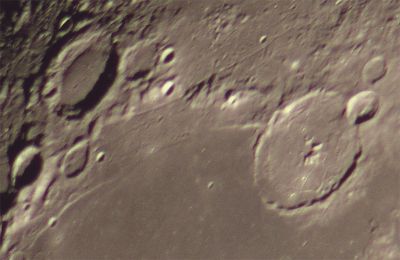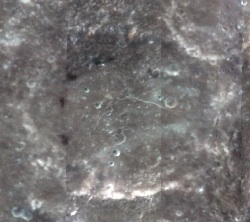Mersenius
Contents
Mersenius
|
Lat: 21.5°S, Long: 49.2°W, Diam: 84 km, Depth: 2.86 km, Rükl 51, Nectarian |


Left: Henrik Bondo, Mersenius is at the top left of this image, with the larger Gassendi on the right and the still larger Mare Humorum at bottom. Right: Closeup of Mersenius from Clementine
Images
LPOD Photo Gallery Lunar Orbiter Images Apollo Images
Mersenius M, the 36th item in C.A.Wood's list of Concentric Craters (1978) is noticeable on the eastern part of Mersenius's floor, near the upper margin of Lunar Orbiter 4's photograph LOIV-149-h1.
Research: Danny Caes
Maps
(LAC zone 93A4) LAC map Geologic map
Description
Description: Elger
(IAU Directions) MERSENIUS.--With its extensive rill-system and interesting surroundings, one of the most notable ring-plains in the third quadrant. It is 41 miles in diameter, and is encircled by a fine rampart, which on the side fronting the Mare Humorum rises 7,000 feet above the floor, which is distinctly convex, and is depressed 3,000 feet below the region on the W., though it stands considerably above the level of the Mare. The prominently terraced border is tolerably regular on the N.E., but on the S. and S.W. is much broken by craters and depressions, the largest and most conspicuous interrupting the continuity of its summit-ridge on the latter side. A fine crater-row traverses the central part of the interior, nearly axially, and a delicate cleft crosses the N. half of the floor from the inner foot of the N.W. wall to a crater not far from the opposite side. I detected another cleft on November 11, 1883, also crossing the N. side of the floor.
South of Mersenius is the fine ring-plain Mersenius d, about 20 miles in diameter, situated on the border of the Mare; and, extending in a line from this towards Vieta are two others (a, and Cavendish d,), somewhat larger, but otherwise similar; the more westerly being connected with Cavendish by a mountain arm. One of the principal clefts of the system (all of which run roughly parallel to the N.W. side of the Mare, and extend to the Percy Mountains W. of Gassendi) crosses the floor of d, and, I believe, partially cuts into its E. wall. Another, the coarsest, abuts on a mountain arm connecting d with Mersenius, and, reappearing on the W. side, runs up to the N.E. wall of the other ring- plain, a, and, again reappearing on the W. of this, strikes across the rugged ground between a and Cavendish d, traversing its floor and border, as does also another cleft to the N. of it. Cavendish d includes a coarse cleft on its floor, running from N. to S., which I have frequently glimpsed with a 4 inch achromatic. There are two other delicate clefts running from the Gassendi region to the S.E. side of Mersenius, which are in part crater-rills.
Description: Wikipedia
Additional Information
- Depth data from Kurt Fisher database
- Westfall, 2000: 2.86 km
- Viscardy, 1985: 2.3 km
- Cherrington, 1969: 2.28 km
- Mersenius M concentric crater
- Satellite craters Mersenius C, Ce and S are on the ALPO list of bright ray craters.
- Satellite crater Mersenius S is on the ALPO list of banded craters
Nomenclature
- Mersenne, Marin; French mathematician, physicist (1588-1648).
- Hugh Percy Wilkins and Paluzie-Borrell called Mersenius B Landerer and Mersenius D Jiyah, but the I.A.U. did not accept both names.
- Landerer (José Joaquin Landerer Climent) was a Spanish astronomer (1841-1922).
- Jiyah (Abraham Ben Jiyah, author of ESFERA DEL MUNDO) was also a Spanish astronomer (1070-1105).
LPOD Articles
Lunar 100
L44: Domed floor cut by secondary craters.
Bibliography
- Wood, C.A. 3/2007. Odd Lunar Domes. S&T 113(3):55-56
- Mersenius B ("Landerer") and Mersenius D ("Jiyah"): THE MOON by H.P.Wilkins and P.Moore.